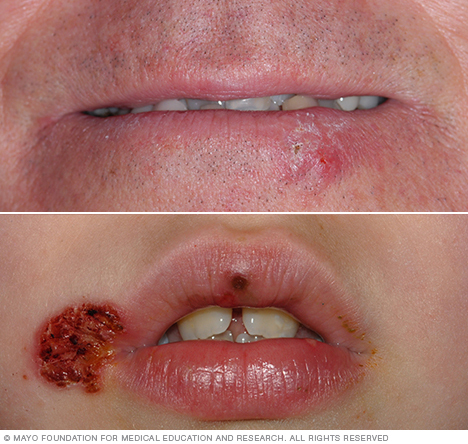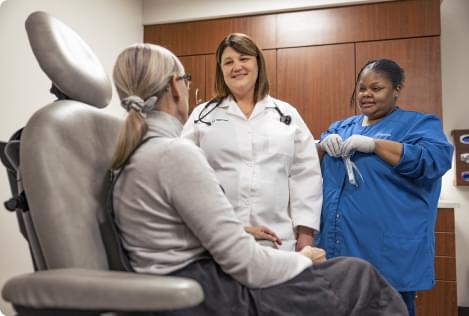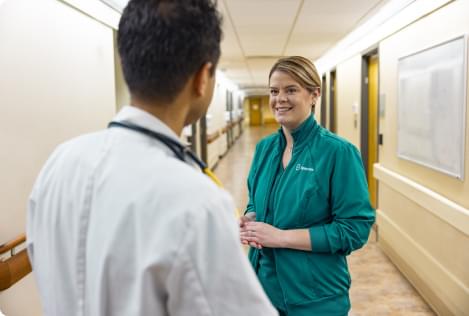Overview
Cold sores, or fever blisters, are a common viral infection. They are tiny, fluid-filled blisters on and around the lips. These blisters are often grouped together in patches. After the blisters break, a scab forms that can last several days. Cold sores usually heal in 2 to 3 weeks without leaving a scar.
Cold sores spread from person to person by close contact, such as kissing. They're usually caused by herpes simplex virus type 1 (HSV-1), and less commonly herpes simplex virus type 2 (HSV-2). Both of these viruses can affect the mouth or genitals and can be spread by oral sex. The virus can spread even if you don't see the sores.
There's no cure for cold sores, but treatment can help manage outbreaks. Prescription antiviral medicine or creams can help sores heal more quickly. And they may make future outbreaks happen less often and be shorter and less serious.

Symptoms
A cold sore usually passes through several stages:
- Tingling and itching. Many people feel itching, burning or tingling around the lips for a day or so before a small, hard, painful spot appears and blisters form.
- Blisters. Small fluid-filled blisters often form along the border of the lips. Sometimes they appear around the nose or cheeks or inside the mouth.
- Oozing and crusting. The small blisters may merge and then burst. This can leave shallow open sores that ooze and crust over.
Symptoms vary, depending on whether this is your first outbreak or a recurrence. The first time you have a cold sore, symptoms may not start for up to 20 days after you were first exposed to the virus. The sores can last several days. And the blisters can take 2 to 3 weeks to heal completely. If blisters return, they'll often appear at the same spot each time and tend to be less severe than the first outbreak.
In a first-time outbreak, you also might experience:
- Fever.
- Painful gums.
- Sore throat.
- Headache.
- Muscle aches.
- Swollen lymph nodes.
Children under 5 years old may have cold sores inside their mouths. These sores are often mistaken for canker sores. Canker sores involve only the mucous membrane and aren't caused by the herpes simplex virus.
When to see a doctor
Cold sores generally clear up without treatment. See your health care provider if:
- You have a weak immune system.
- The cold sores don't heal within two weeks.
- Symptoms are severe.
- The cold sores often return.
- You have gritty or painful eyes.
Causes
Cold sores are caused by certain strains of the herpes simplex virus (HSV). HSV-1 usually causes cold sores. HSV-2 is often the cause of genital herpes. But either type can spread to the face or genitals through close contact, such as kissing or oral sex. Shared eating utensils, razors and towels can also spread HSV-1.
Cold sores are most likely to spread when you have oozing blisters. But you can spread the virus even if you don't have blisters. Many people who are infected with the virus that causes cold sores never develop symptoms.
Once you've had a herpes infection, the virus can hide in nerve cells in the skin and may cause another cold sore at the same place as before. A return of cold sores may be triggered by:
- Viral infection or fever.
- Hormonal changes, such as those related to a menstrual period.
- Stress.
- Fatigue.
- Being in the sun or wind.
- Changes in the immune system.
- Injury to the skin.
Risk factors
Almost everyone is at risk of cold sores. Most adults carry the virus that causes cold sores, even if they've never had symptoms.
You're most at risk of complications from the virus if you have a weak immune system from conditions and treatments such as:
- HIV/AIDS.
- Atopic dermatitis (eczema).
- Cancer chemotherapy.
- Anti-rejection medicine for organ transplants.
Complications
In some people, the virus that causes cold sores can cause problems in other areas of the body, including:
- Fingertips. Both HSV-1 and HSV-2 can be spread to the fingers. This type of infection is often referred to as herpes whitlow. Children who suck their thumbs may transfer the infection from their mouths to their thumbs.
- Eyes. The virus can sometimes cause eye infection. Repeated infections can cause scarring and injury, which may lead to vision problems or loss of vision.
- Widespread areas of skin. People who have a skin condition called atopic dermatitis (eczema) are at higher risk of cold sores spreading all across their bodies. This can become a medical emergency.
Prevention
Your health care provider may prescribe an antiviral medicine for you to take on a regular basis if you develop cold sores more than nine times a year or if you're at high risk of serious complications. If sunlight seems to trigger your condition, apply sunblock to the spot where the cold sore tends to form. Or talk with your health care provider about using an oral antiviral medicine before you do an activity that tends to cause a cold sore to return.
Take these steps to help avoid spreading cold sores to other people:
- Avoid kissing and skin contact with people while blisters are present. The virus spreads most easily when the blisters leak fluid.
- Avoid sharing items. Utensils, towels, lip balm and other personal items can spread the virus when blisters are present.
- Keep your hands clean. When you have a cold sore, wash your hands carefully before touching yourself and other people, especially babies.
Diagnosis
Your health care provider can usually diagnose cold sores just by looking at them. To confirm the diagnosis, your health care provider might take a sample from the blister for testing in a laboratory.
Treatment
Cold sores often clear up without treatment in 2 to 4 weeks. Your doctor might prescribe antiviral medicine that may speed the healing process. Examples include:
- Acyclovir (Zovirax).
- Valacyclovir (Valtrex).
- Famciclovir.
- Penciclovir (Denavir).
Some of these products are pills. Others are creams you put on the sores several times a day. In general, the pills work better than the creams. For very severe infections, some antiviral medicines can be injected.
Lifestyle and home remedies
The cold sore ointment docosanol (Abreva) may shorten the healing time of a cold sore. At the first sign of symptoms, apply it to the affected skin as directed on the package. Use a cotton-tipped swab to put medicine on a cold sore. This helps prevent the spread of the sores to other parts of the body.
To ease the discomfort of a cold sore:
- Try other cold sore remedies. Some nonprescription products contain a drying agent, such as alcohol, that may speed healing.
- Use lip balms and cream. Protect your lips from the sun with a zinc oxide cream or lip balm with sunblock. If your lips become dry, apply a moisturizing cream.
- Apply a compress. A cold, damp cloth may ease symptoms and help remove crusting. Or try using a warm cloth on the blisters to ease pain.
- Rest and try pain relievers. Take nonprescription pain medicine if you have a fever or the cold sore is painful. Creams with lidocaine or benzocaine may offer some pain relief.
Alternative medicine
Studies about whether alternative medicine helps with cold sores have had mixed results. Some approaches that people use for cold sores include:
- Lysine. An amino acid, lysine is available as an oral supplement and as a cream.
- Rhubarb and sage. A cream combining rhubarb and sage may be about as effective as acyclovir (Zovirax) cream.
- Stress reduction. If your cold sores are brought on by stress, you might want to try relaxation techniques. Examples include deep-breathing exercises and meditation.
- Propolis. This is available as a 3% ointment. When applied early and often, it might shorten the duration of the breakout. This product is also called synthetic beeswax.
Preparing for an appointment
Cold sores often clear up without treatment in 2 to 4 weeks. Make an appointment with your primary care provider if your cold sores:
- Are lasting or severe.
- Return often.
- Are accompanied by eye pain or gritty eyes.
What you can do
Before your appointment, you may want to list answers to the following questions:
- Have you ever had these symptoms before?
- Do you have a history of skin problems?
- What medicines and supplements do you take regularly?
Below are some basic questions to ask your health care provider about cold sores.
- Do I have a cold sore?
- What treatment do you recommend, if any?
- What self-care steps might ease my symptoms?
- Can I spread this condition to others? For how long?
- How do I reduce the risk of spreading this condition to others?
- How soon do you expect my symptoms will improve?
- Am I at risk of complications from this condition?
- Can I do anything to help prevent another blister?
What to expect from your doctor
Your health care provider is likely to ask you a few questions. Being ready to answer them may reserve time to go over any points you want to talk about in-depth. Your health care provider may ask:
- Could you sense a cold sore coming before you could see it?
- Do your symptoms include eye pain or gritty eyes?
- Does anything seem to bring on your symptoms?
- Have you been treated for cold sores in the past? If so, what treatment helped the most?
- Have you been under stress lately or had major life changes?
- Are you pregnant?
- Does your work or home life bring you into contact with infants or with people who have major illness?
© 1998-2024 Mayo Foundation for Medical Education and Research (MFMER). All rights reserved. Terms of Use


